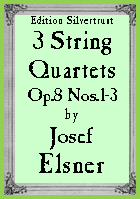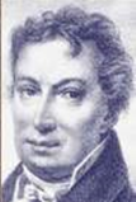Presents
Joseph Elsner
|
Op.8 No.1 in C Major - Op.8 No.2 in E flat Major |
 |
 |
Op.8 No.3 in d minor |
Three String Quartets, Op.8 Nos.1-3
Joseph Elsner (1769-1854) was born in the Silesian town of Grottkau, then part of Prussia, now in Poland. It is not known with whom he studied violin and composition, but he became proficient at both and served as second concertmaster in Lemberg (Lwow, Lvov, Lviv) and then in Warsaw where he worked as a theater director and co-founder of what eventually became the Warsaw Conservatory. He pursued a career as a teacher and a composer. His influence on Polish music cannot be over estimated. Among his many student were Ignacy Dobrzynski, Stanislaw Moniusko and Frederic Chopin. His three Op.8 String Quartets were completed in 1796 and published by the German firm of Jean Andre of Offenbach. This was during his time in Lemberg where he often played quartets in the homes and salons of the upper classes. And this probably provided impetus to compose some quartets for his own use in chamber music soirees. We have reprinted the one and, to the best of our knowledge, only edition of these works. It is a clean and very readable edition.
Op.8 No.1 in C Major has only two movements. The opening Allegro moderato is bright and elegant, written in concertante form with each voice receiving an opportunity with the melody. It shows the influence of the Parisian Quatuors Concertants. The dramatic mood swings which are created by sudden changes in dynamics and modulations were probably a product of Elsner having been a conductor of operas. The second movement is a theme and set of variations with each instrument getting a chance to shine in different variations. A rather fetching variation in the minor appears in the middle of the set.
Op.8 No.2 in E flat Major begins with a very substantial Adagio introduction which in and of itself was rather unusual. It leads to a dancing Allegro in which all of the voices get solos. The middle movement, Andantino, surprises with its passionate outbursts after its stately opening bars. The quartet ends with a lively Rondo allegretto which both by virtue of its jaunty melody and rhythm make clear that Elsner had the Krakoviak, a traditional Polish folk dance, in mind.
Op.8 No.3 in d minor opens in a somewhat gloomy and agitated fashion. The repetition of the opening rhythmic figure creates tension and a certain unrest. But surprisingly, this is followed by a sunny, cheerful section. So different is it, that it hardly seems related to what has come before. The middle movement, an Andantino, begins as a quiet but beautiful song without words. But towards the end there are unexpected dramatic outbusts The finale, Rondo, allegretto, begins in a jerky start-stop fashion, which is then interrupted by a brief virtuosic violin passage which in turn is followed by a heavy, almost lugubrious stylized Polacca that has an ominious mood.
These quartets are important from an historical standpoint in that they are, along with his three Op.1 quartets, the first "Polish" string quartets, albeit, by an ethnic German composer. Elsner not only researched Polish music but also wrote of his quartets that they were composed in "...the best Polish style", clearly a reference to the fact that he used the melodies and rhythms of traditional Polish folk dances such as the Polacca and Krakoviak. But beyond this, the quartets are appealing works which can stand on their own merit. In an effort to stimulate interest in them, we offer all three together at a very attractive price.
Parts: $29.95